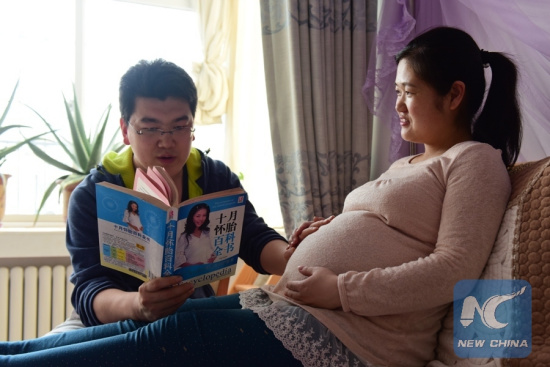
Nurse Song Mingming (L) reads a book to his wife Yu Junxia, who is pregnant, at home in Yantai, east China's Shandong Province, May 10, 2016. (Xinhua/File Photo)
Induction of labor in pregnant women appears not to be associated with increased risk of autism in their children, a large study of Swedish children said Monday.
The new finding suggested that concern about autism risk should not factor into clinical decisions about whether or not to induce labor, said the study published online in the U.S. journal JAMA Pediatrics.
Labor induction is recommended when labor doesn't progress on its own and there's concern that waiting for it to start could endanger the health of the baby or mother.
In 2013, a U.S. study suggested a possible association between induction of labor and risk of autism in offspring.
In the new study, Anna Sara Oberg of the Harvard T.H. Chan School of Public Health and colleagues studied over one million live births in Sweden between 1992 and 2005, who they followed until 2013 to look for any neuropsychiatric diagnoses.
Nearly two percent of babies in the study population were diagnosed with autism during the follow-up period, the researchers found.
Overall, 11 percent of the deliveries had involved induction of labor, often due to pregnancy complications such as gestational diabetes, gestational hypertension, and preeclampsia, and 23 percent of the induced pregnancies were post-term.
In their initial comparison of individuals who weren't related to each other, the researchers found an association between labor induction and autism risk, similar to that previously reported.
But when they compared "induction-discordant" siblings born to the same mother -- one was the result of induced labor and the other wasn't, they no longer saw an association.
"Many of the factors that could lead to both induction of labor and autism are completely or partially shared by siblings -- such as maternal characteristics or socioeconomic or genetic factors," Oberg explained.
"Finding no association when comparing siblings suggests that previously observed associations could have been due to some of these familial factors -- not the result of induction."
"Overall, these findings should provide reassurance to women who are about to give birth, that having their labor induced will not increase their child's risk of developing autism spectrum disorders," added senior author Brian Bateman, anesthesiologist and associate professor of anesthesia at Massachusetts General Hospital and Brigham and Women's Hospital, Harvard Medical School.


















































